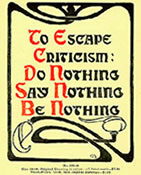
Joystiq writer Blake Snow has seized upon a passage in the recently-touted Videogame Style Guide as an opportunity to play the defeatist in the gaming household. The section in question differentiates between reviews of games and criticism of games, arguing that the former is a descriptive format, and the latter is an interaction of sorts with the game in question. For unknown reasons, this rankles Mr. Snow, whose opinion is that "Saying video games need developed critique at this stage is like saying b-movies are worthy of profound analysis."
This is an absurd position to hold. It summons an image of Mr. Snow, hands on hips, staring at the children he may or may not have, instructing them not to attempt playing the piano because their fingers are too stubby at age three, and also the noise hurts his ears.
He’s running through a gaping logical flaw, assuming that authorial intent has anything to do with criticism. He’s assuming that only when writers intend — and subjectively succeed — to tell a mature story in a videogame should we be allowed to exercise true criticism.
That’s not how criticism works. Everything benefits from criticism, and everything deserves it. It’s not "pretentious," as Mr. Snow claims, to attempt an intellectual interaction with anything. Pretentiousness develops from bad criticism; it’s not an inherent part of the process. In fact, the further down the abstract ladder of developed maturity, the more a piece can benefit from criticism, not because the criticism benefits the developers — real critics are long past caring what the author thinks — but because there are a lot of games down toward the bottom, and criticism exploits relational context. There’s not often much to say about those games beyond examining their context, but criticism aimed at them is wholly earned.
A second problem with Snow’s argument is that he seems to be assuming that B-grade games will disappear as the medium develops on his Elizabethan sense of maturity. That’s just ridiculous. B-grade games will always exist, and always be just as worthy of criticism as their more widely-respected cousins. We criticize a lot of poor quality media around here, not because it’s required of us, but because there are always analyses to make. Mr. Snow’s pronouncement that such intellectualism is "pretentious" is repressive without shame.
While my collar is hot, let me finish off by saying that Mr. Snow’s focus on story as sole touchstone of maturity is a further insult to gaming criticism. Gameplay elements are on equal footing with story elements in a true critic’s regard. Possibly the critics themselves ought to mature before handing out analyses, but the medium is plenty ready to receive as much intellectual interaction as possible.